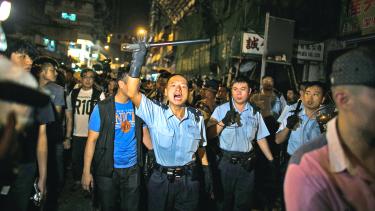waltky
Wise ol' monkey
- Thread starter
- #41
Dissent & democracy in Taiwan could be a model for China...

Repressing dissent kills democracy
Wed, Jul 31, 2013 - The right to dissent is an important fundamental value that is universally cherished by modern democratic states. In democratic culture and under constitutional rule, the need to respect dissenting views is seen as self-evident. Truly democratic societies do not just tolerate dissent, they encourage it.
Repressing dissent kills democracy
Wed, Jul 31, 2013 - The right to dissent is an important fundamental value that is universally cherished by modern democratic states. In democratic culture and under constitutional rule, the need to respect dissenting views is seen as self-evident. Truly democratic societies do not just tolerate dissent, they encourage it.
Democratic governments should use institutional means to ensure that dissidents can openly express opinions that differ from the mainstream without fear of reprisal. Authorities should also safeguard the right of dissidents to criticize the government, even provocatively. Taiwans Constitution protects dissidents freedom of speech for good reason, namely to promote genuine competition in the marketplace of ideas so all kinds of opinions can compete openly. Offered a wide range of information and opinions available, people will then be able to seek out the truth, as well as deepen their knowledge and gain enlightenment from exposure to new ideas.
Freely competing ideas nurture autonomous citizenship and facilitate individuals quest for self-actualization, so when those who support societys majority opinions are willing to protect so-called minority dissidents it provides them with room to grow through the absorption of knowledge and ideas, even if they are only doing so in anticipation of the day when they find themselves in the minority. The reason the Constitution guarantees dissidents freedom of expression is to ensure that ordinary people, having entrusted their rulers with the power to govern through regular elections, remain the masters of the nation. Therefore, no matter who is ruling the country at any particular time, constitutions protect peoples right to have and express views that oppose those of their rulers.
Constitutions safeguard the publics right to engage in unfettered criticism of the government, to keep an eye on the government in case it abuses its powers and even encourage the exposure of abuses by whistleblowers who are familiar with the inner workings of government. Only when the right to dissent is guaranteed can citizens genuinely participate in a democracy. This participation is the source of a societys vitality, serves as a corrective balance for rulers biases and is the essential motivating force driving a society to engage in collective reflection and institutional reform. Democracies need to provide multiple channels through which the public can express any dissenting views they have and to supervise the government to ensure that policymaking is legitimate and transparent.
Governments have a duty to provide concrete, detailed information about their governance and policymaking, engage in genuine dialogue with their citizens and allow themselves to be tested. However, instead of fulfilling these duties, the Taiwanese government paternalistically trumpets the supposed benefits of controversial policies such as the cross-strait service trade agreement, while accusing anyone who disagrees with its opinion of drawing a distorted picture of the policies. If there is no frank, open dialogue between the state and the public, how can anyone judge which side is doing the distorting? If ordinary people have no access to genuine dialogue and no way of supervising the government, it should hardly come as a surprise when guerrilla-like protests pop up everywhere.
More Repressing dissent kills democracy - Taipei Times


